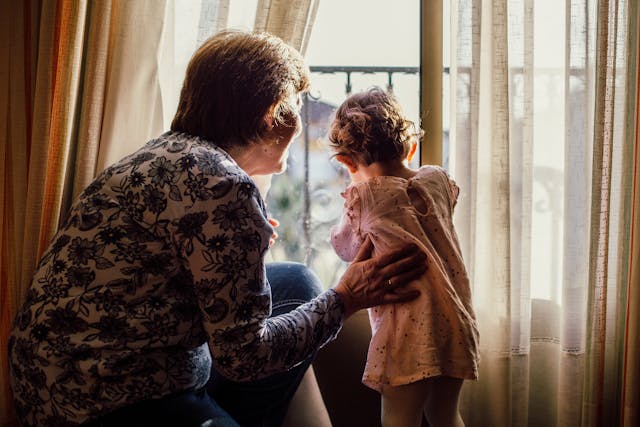When Parents Become Grandparents: Navigating Shifting Family Roles
Becoming a grandparent is an exciting milestone in many people’s lives. However, with this new role comes the challenge of adjusting to different expectations, relationships, and responsibilities. As parents become grandparents, they often find themselves transitioning into new family dynamics, all while balancing their ongoing role as parents. Here’s how to navigate these changes and thrive in your new role as a grandparent.

Understanding the New Dynamic
The Shift from Parent to Grandparent
When parents become grandparents, they experience a shift in their family role. While they still hold the responsibility of raising their own children, the addition of grandchildren brings a new, fulfilling layer to their lives. Grandparents often want to be actively involved in their grandchildren’s lives, but it’s essential to recognize the boundaries between parenting and grandparenting.
Understanding that your children are now the primary caregivers helps in respecting their parenting style. The key is to offer support, guidance, and love without stepping on their toes. Each family has its unique set of expectations, and communication is essential to ensure that everyone is on the same page.
Building Strong Relationships with Grandchildren
Bonding with the Next Generation
As a grandparent, your relationship with your grandchildren may start off differently from the one you had with your own children. At first, it might be a bit more distant, especially if the children are young. However, with time, your bond can deepen, and you can enjoy sharing experiences and wisdom.
Spending quality time together is vital. Whether it’s babysitting, reading stories, playing games, or simply having fun, these moments create lasting memories. Be patient as you get to know each other’s personalities, and allow the relationship to evolve naturally.
Navigating Boundaries with Your Adult Children
Respecting Parenting Decisions
One of the most significant shifts for new grandparents is adjusting to the fact that their adult children are now in charge of their own families. It can be challenging to let go of the parenting reins, especially when you might disagree with certain parenting choices. However, it’s important to remember that your children are now the experts when it comes to raising their children.
Set clear boundaries regarding advice-giving and understand when it’s appropriate to speak up. Offering advice when asked and respecting their decisions when not invited helps foster a positive relationship between you and your adult children. Your role has shifted from primary caregiver to a supportive figure, offering guidance only when needed.
Managing Expectations and Avoiding Overstepping
Communication Is Key
It’s natural to feel the urge to help with childcare or offer unsolicited advice, but grandparents should be mindful of overstepping their role. It’s important to communicate with your children and establish clear boundaries. Understanding their needs and respecting their wishes ensures that the transition into grandparenthood is a positive experience for everyone involved.
Before offering help, ask your children if they need anything. Some families may welcome the assistance, while others may prefer to handle things independently. Being mindful of these preferences and not assuming anything will go a long way in maintaining healthy family relationships.
Supporting the Parent-Grandparent Relationship
Helping Parents Balance Their Roles
Grandparents also play a crucial role in supporting their children as they navigate their own parenting journey. Whether it’s offering a helping hand with childcare, running errands, or providing emotional support, being there for your children as they parent their own kids helps relieve stress and strengthens family bonds.
Being a sounding board for your children without judgment and offering reassurance can provide them with much-needed encouragement. This support also deepens your relationship with both your children and grandchildren, creating a cohesive and loving family dynamic.
Embracing the Joys of Grandparenthood
Creating Memories and Enjoying the Experience
One of the most rewarding aspects of becoming a grandparent is the opportunity to enjoy the next generation without the pressures of day-to-day parenting. This stage of life allows grandparents to spoil their grandchildren with love, attention, and sometimes, indulgences (like sweets or extra playtime). You can focus on fun and memorable experiences that enrich both your life and theirs.
From holidays and special occasions to simple moments spent together, creating traditions and memories with your grandchildren strengthens your bond and brings joy. This time is also an opportunity to pass on family stories, heritage, and values.

Self-Care and Adjusting to Change
Taking Care of Yourself
While it’s easy to get caught up in the excitement of being a grandparent, it’s important to remember that this role, like any other, requires self-care. Your body may not have the same energy it once did, and you may need to adjust to new routines. Prioritize your physical, mental, and emotional well-being to ensure that you can be the best grandparent possible.
Make time for activities that recharge you, whether it’s exercising, socializing with friends, or pursuing hobbies. By taking care of yourself, you can be more present and engaged with your grandchildren and children.
Conclusion: A New Chapter in Family Life
Becoming a grandparent is a rewarding experience that brings new joys and challenges. It’s a role that allows for a deeper connection with your family and provides an opportunity to offer love, wisdom, and support in a new way. By understanding the new family dynamic, respecting boundaries, and nurturing your relationship with both your adult children and grandchildren, you can embrace this new chapter with joy and fulfillment. Grandparenthood isn’t just about offering advice—it’s about enjoying the journey and creating meaningful memories for years to come.












